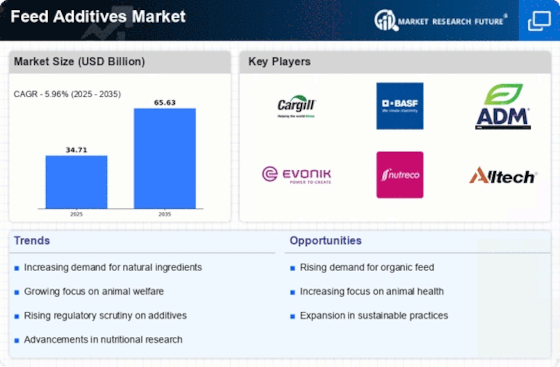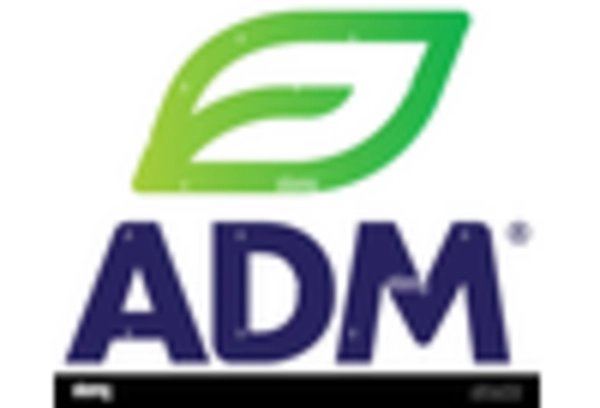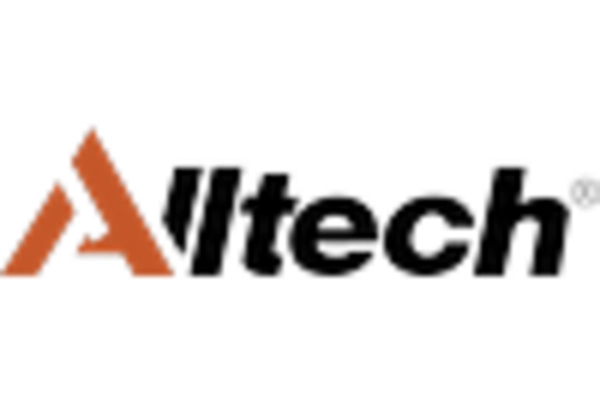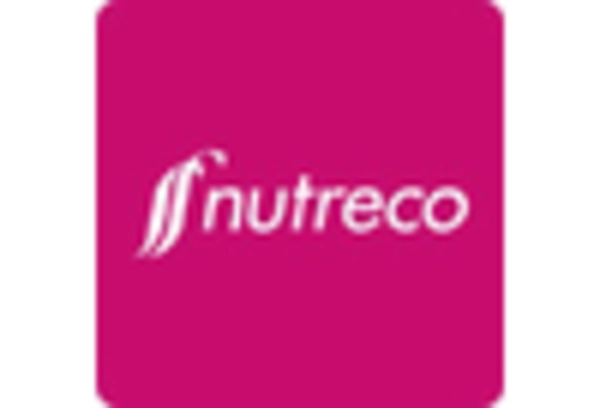Amino Acids
Vitamins
Carotenoids
Enzymes
Prebiotics & Probiotics
Minerals
Acidifiers
Lipids
Others
Dry
Liquid
Poultry
Swine
Ruminants
Others
North America
Europe
South America
Asia Pacific
Middle East and Africa
North America Outlook (USD Billion, 2019-2035)
North America Feed Additives Market by Type
Amino Acids
Vitamins
Carotenoids
Enzymes
Prebiotics & Probiotics
Minerals
Acidifiers
Lipids
Others
North America Feed Additives Market by Form Type
Dry
Liquid
North America Feed Additives Market by Livestock Type
Poultry
Swine
Ruminants
Others
North America Feed Additives Market by Regional Type
US
Canada
US Outlook (USD Billion, 2019-2035)
US Feed Additives Market by Type
Amino Acids
Vitamins
Carotenoids
Enzymes
Prebiotics & Probiotics
Minerals
Acidifiers
Lipids
Others
US Feed Additives Market by Form Type
Dry
Liquid
US Feed Additives Market by Livestock Type
Poultry
Swine
Ruminants
Others
CANADA Outlook (USD Billion, 2019-2035)
CANADA Feed Additives Market by Type
Amino Acids
Vitamins
Carotenoids
Enzymes
Prebiotics & Probiotics
Minerals
Acidifiers
Lipids
Others
CANADA Feed Additives Market by Form Type
Dry
Liquid
CANADA Feed Additives Market by Livestock Type
Poultry
Swine
Ruminants
Others
Europe Outlook (USD Billion, 2019-2035)
Europe Feed Additives Market by Type
Amino Acids
Vitamins
Carotenoids
Enzymes
Prebiotics & Probiotics
Minerals
Acidifiers
Lipids
Others
Europe Feed Additives Market by Form Type
Dry
Liquid
Europe Feed Additives Market by Livestock Type
Poultry
Swine
Ruminants
Others
Europe Feed Additives Market by Regional Type
Germany
UK
France
Russia
Italy
Spain
Rest of Europe
GERMANY Outlook (USD Billion, 2019-2035)
GERMANY Feed Additives Market by Type
Amino Acids
Vitamins
Carotenoids
Enzymes
Prebiotics & Probiotics
Minerals
Acidifiers
Lipids
Others
GERMANY Feed Additives Market by Form Type
Dry
Liquid
GERMANY Feed Additives Market by Livestock Type
Poultry
Swine
Ruminants
Others
UK Outlook (USD Billion, 2019-2035)
UK Feed Additives Market by Type
Amino Acids
Vitamins
Carotenoids
Enzymes
Prebiotics & Probiotics
Minerals
Acidifiers
Lipids
Others
UK Feed Additives Market by Form Type
Dry
Liquid
UK Feed Additives Market by Livestock Type
Poultry
Swine
Ruminants
Others
FRANCE Outlook (USD Billion, 2019-2035)
FRANCE Feed Additives Market by Type
Amino Acids
Vitamins
Carotenoids
Enzymes
Prebiotics & Probiotics
Minerals
Acidifiers
Lipids
Others
FRANCE Feed Additives Market by Form Type
Dry
Liquid
FRANCE Feed Additives Market by Livestock Type
Poultry
Swine
Ruminants
Others
RUSSIA Outlook (USD Billion, 2019-2035)
RUSSIA Feed Additives Market by Type
Amino Acids
Vitamins
Carotenoids
Enzymes
Prebiotics & Probiotics
Minerals
Acidifiers
Lipids
Others
RUSSIA Feed Additives Market by Form Type
Dry
Liquid
RUSSIA Feed Additives Market by Livestock Type
Poultry
Swine
Ruminants
Others
ITALY Outlook (USD Billion, 2019-2035)
ITALY Feed Additives Market by Type
Amino Acids
Vitamins
Carotenoids
Enzymes
Prebiotics & Probiotics
Minerals
Acidifiers
Lipids
Others
ITALY Feed Additives Market by Form Type
Dry
Liquid
ITALY Feed Additives Market by Livestock Type
Poultry
Swine
Ruminants
Others
SPAIN Outlook (USD Billion, 2019-2035)
SPAIN Feed Additives Market by Type
Amino Acids
Vitamins
Carotenoids
Enzymes
Prebiotics & Probiotics
Minerals
Acidifiers
Lipids
Others
SPAIN Feed Additives Market by Form Type
Dry
Liquid
SPAIN Feed Additives Market by Livestock Type
Poultry
Swine
Ruminants
Others
REST OF EUROPE Outlook (USD Billion, 2019-2035)
REST OF EUROPE Feed Additives Market by Type
Amino Acids
Vitamins
Carotenoids
Enzymes
Prebiotics & Probiotics
Minerals
Acidifiers
Lipids
Others
REST OF EUROPE Feed Additives Market by Form Type
Dry
Liquid
REST OF EUROPE Feed Additives Market by Livestock Type
Poultry
Swine
Ruminants
Others
APAC Outlook (USD Billion, 2019-2035)
APAC Feed Additives Market by Type
Amino Acids
Vitamins
Carotenoids
Enzymes
Prebiotics & Probiotics
Minerals
Acidifiers
Lipids
Others
APAC Feed Additives Market by Form Type
Dry
Liquid
APAC Feed Additives Market by Livestock Type
Poultry
Swine
Ruminants
Others
APAC Feed Additives Market by Regional Type
China
India
Japan
South Korea
Malaysia
Thailand
Indonesia
Rest of APAC
CHINA Outlook (USD Billion, 2019-2035)
CHINA Feed Additives Market by Type
Amino Acids
Vitamins
Carotenoids
Enzymes
Prebiotics & Probiotics
Minerals
Acidifiers
Lipids
Others
CHINA Feed Additives Market by Form Type
Dry
Liquid
CHINA Feed Additives Market by Livestock Type
Poultry
Swine
Ruminants
Others
INDIA Outlook (USD Billion, 2019-2035)
INDIA Feed Additives Market by Type
Amino Acids
Vitamins
Carotenoids
Enzymes
Prebiotics & Probiotics
Minerals
Acidifiers
Lipids
Others
INDIA Feed Additives Market by Form Type
Dry
Liquid
INDIA Feed Additives Market by Livestock Type
Poultry
Swine
Ruminants
Others
JAPAN Outlook (USD Billion, 2019-2035)
JAPAN Feed Additives Market by Type
Amino Acids
Vitamins
Carotenoids
Enzymes
Prebiotics & Probiotics
Minerals
Acidifiers
Lipids
Others
JAPAN Feed Additives Market by Form Type
Dry
Liquid
JAPAN Feed Additives Market by Livestock Type
Poultry
Swine
Ruminants
Others
SOUTH KOREA Outlook (USD Billion, 2019-2035)
SOUTH KOREA Feed Additives Market by Type
Amino Acids
Vitamins
Carotenoids
Enzymes
Prebiotics & Probiotics
Minerals
Acidifiers
Lipids
Others
SOUTH KOREA Feed Additives Market by Form Type
Dry
Liquid
SOUTH KOREA Feed Additives Market by Livestock Type
Poultry
Swine
Ruminants
Others
MALAYSIA Outlook (USD Billion, 2019-2035)
MALAYSIA Feed Additives Market by Type
Amino Acids
Vitamins
Carotenoids
Enzymes
Prebiotics & Probiotics
Minerals
Acidifiers
Lipids
Others
MALAYSIA Feed Additives Market by Form Type
Dry
Liquid
MALAYSIA Feed Additives Market by Livestock Type
Poultry
Swine
Ruminants
Others
THAILAND Outlook (USD Billion, 2019-2035)
THAILAND Feed Additives Market by Type
Amino Acids
Vitamins
Carotenoids
Enzymes
Prebiotics & Probiotics
Minerals
Acidifiers
Lipids
Others
THAILAND Feed Additives Market by Form Type
Dry
Liquid
THAILAND Feed Additives Market by Livestock Type
Poultry
Swine
Ruminants
Others
INDONESIA Outlook (USD Billion, 2019-2035)
INDONESIA Feed Additives Market by Type
Amino Acids
Vitamins
Carotenoids
Enzymes
Prebiotics & Probiotics
Minerals
Acidifiers
Lipids
Others
INDONESIA Feed Additives Market by Form Type
Dry
Liquid
INDONESIA Feed Additives Market by Livestock Type
Poultry
Swine
Ruminants
Others
REST OF APAC Outlook (USD Billion, 2019-2035)
REST OF APAC Feed Additives Market by Type
Amino Acids
Vitamins
Carotenoids
Enzymes
Prebiotics & Probiotics
Minerals
Acidifiers
Lipids
Others
REST OF APAC Feed Additives Market by Form Type
Dry
Liquid
REST OF APAC Feed Additives Market by Livestock Type
Poultry
Swine
Ruminants
Others
South America Outlook (USD Billion, 2019-2035)
South America Feed Additives Market by Type
Amino Acids
Vitamins
Carotenoids
Enzymes
Prebiotics & Probiotics
Minerals
Acidifiers
Lipids
Others
South America Feed Additives Market by Form Type
Dry
Liquid
South America Feed Additives Market by Livestock Type
Poultry
Swine
Ruminants
Others
South America Feed Additives Market by Regional Type
Brazil
Mexico
Argentina
Rest of South America
BRAZIL Outlook (USD Billion, 2019-2035)
BRAZIL Feed Additives Market by Type
Amino Acids
Vitamins
Carotenoids
Enzymes
Prebiotics & Probiotics
Minerals
Acidifiers
Lipids
Others
BRAZIL Feed Additives Market by Form Type
Dry
Liquid
BRAZIL Feed Additives Market by Livestock Type
Poultry
Swine
Ruminants
Others
MEXICO Outlook (USD Billion, 2019-2035)
MEXICO Feed Additives Market by Type
Amino Acids
Vitamins
Carotenoids
Enzymes
Prebiotics & Probiotics
Minerals
Acidifiers
Lipids
Others
MEXICO Feed Additives Market by Form Type
Dry
Liquid
MEXICO Feed Additives Market by Livestock Type
Poultry
Swine
Ruminants
Others
ARGENTINA Outlook (USD Billion, 2019-2035)
ARGENTINA Feed Additives Market by Type
Amino Acids
Vitamins
Carotenoids
Enzymes
Prebiotics & Probiotics
Minerals
Acidifiers
Lipids
Others
ARGENTINA Feed Additives Market by Form Type
Dry
Liquid
ARGENTINA Feed Additives Market by Livestock Type
Poultry
Swine
Ruminants
Others
REST OF SOUTH AMERICA Outlook (USD Billion, 2019-2035)
REST OF SOUTH AMERICA Feed Additives Market by Type
Amino Acids
Vitamins
Carotenoids
Enzymes
Prebiotics & Probiotics
Minerals
Acidifiers
Lipids
Others
REST OF SOUTH AMERICA Feed Additives Market by Form Type
Dry
Liquid
REST OF SOUTH AMERICA Feed Additives Market by Livestock Type
Poultry
Swine
Ruminants
Others
MEA Outlook (USD Billion, 2019-2035)
MEA Feed Additives Market by Type
Amino Acids
Vitamins
Carotenoids
Enzymes
Prebiotics & Probiotics
Minerals
Acidifiers
Lipids
Others
MEA Feed Additives Market by Form Type
Dry
Liquid
MEA Feed Additives Market by Livestock Type
Poultry
Swine
Ruminants
Others
MEA Feed Additives Market by Regional Type
GCC Countries
South Africa
Rest of MEA
GCC COUNTRIES Outlook (USD Billion, 2019-2035)
GCC COUNTRIES Feed Additives Market by Type
Amino Acids
Vitamins
Carotenoids
Enzymes
Prebiotics & Probiotics
Minerals
Acidifiers
Lipids
Others
GCC COUNTRIES Feed Additives Market by Form Type
Dry
Liquid
GCC COUNTRIES Feed Additives Market by Livestock Type
Poultry
Swine
Ruminants
Others
SOUTH AFRICA Outlook (USD Billion, 2019-2035)
SOUTH AFRICA Feed Additives Market by Type
Amino Acids
Vitamins
Carotenoids
Enzymes
Prebiotics & Probiotics
Minerals
Acidifiers
Lipids
Others
SOUTH AFRICA Feed Additives Market by Form Type
Dry
Liquid
SOUTH AFRICA Feed Additives Market by Livestock Type
Poultry
Swine
Ruminants
Others
REST OF MEA Outlook (USD Billion, 2019-2035)
REST OF MEA Feed Additives Market by Type
Amino Acids
Vitamins
Carotenoids
Enzymes
Prebiotics & Probiotics
Minerals
Acidifiers
Lipids
Others
REST OF MEA Feed Additives Market by Form Type
Dry
Liquid
REST OF MEA Feed Additives Market by Livestock Type
Poultry
Swine
Ruminants
Others


















Leave a Comment